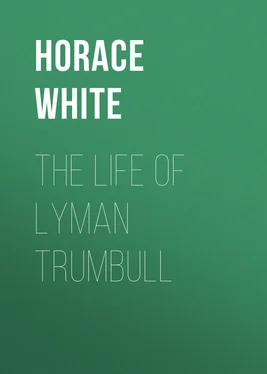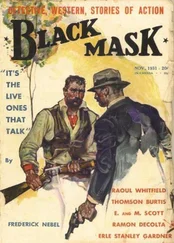Horace White - The Life of Lyman Trumbull
Здесь есть возможность читать онлайн «Horace White - The Life of Lyman Trumbull» — ознакомительный отрывок электронной книги совершенно бесплатно, а после прочтения отрывка купить полную версию. В некоторых случаях можно слушать аудио, скачать через торрент в формате fb2 и присутствует краткое содержание. Жанр: foreign_prose, История, foreign_edu, foreign_antique, на английском языке. Описание произведения, (предисловие) а так же отзывы посетителей доступны на портале библиотеки ЛибКат.
- Название:The Life of Lyman Trumbull
- Автор:
- Жанр:
- Год:неизвестен
- ISBN:нет данных
- Рейтинг книги:5 / 5. Голосов: 1
-
Избранное:Добавить в избранное
- Отзывы:
-
Ваша оценка:
- 100
- 1
- 2
- 3
- 4
- 5
The Life of Lyman Trumbull: краткое содержание, описание и аннотация
Предлагаем к чтению аннотацию, описание, краткое содержание или предисловие (зависит от того, что написал сам автор книги «The Life of Lyman Trumbull»). Если вы не нашли необходимую информацию о книге — напишите в комментариях, мы постараемся отыскать её.
The Life of Lyman Trumbull — читать онлайн ознакомительный отрывок
Ниже представлен текст книги, разбитый по страницам. Система сохранения места последней прочитанной страницы, позволяет с удобством читать онлайн бесплатно книгу «The Life of Lyman Trumbull», без необходимости каждый раз заново искать на чём Вы остановились. Поставьте закладку, и сможете в любой момент перейти на страницу, на которой закончили чтение.
Интервал:
Закладка:
A letter from Mrs. Trumbull to her father-in-law, May 4, 1846, mentions the birth of a second son (Walter), then two and a half months old. It informs him also that her husband has been nominated for Congress by the Democrats of the First District, the vote in the convention being, Lyman Trumbull, 24; John Dougherty, 5; Robert Smith, 8. The political issues in this campaign are obscure, but the result of the election was again adverse. The supporters of Robert Smith nominated him as a bolting candidate; the Whigs made no nomination, but supported Smith, who was elected.
A letter written by Mrs. Trumbull at Springfield, December 16, 1846, mentions the first election of Stephen A. Douglas as United States Senator. "A party is to be given in his name," she says, "at the State House on Friday evening under the direction of Messrs. Webster and Hickox. The tickets come in beautiful envelopes, and I understand that Douglas has authorized the gentlemen to expend $50 in music, and directed the most splendid entertainment that was ever prepared in Springfield."
A letter to Benjamin Trumbull, Sr., from his son of the same name, who was cultivating a small farm near Springfield, gives another glimpse of the family health record, saying that "both Lyman and George have had chills and fever two or three days this spring"; also, that "Lyman's child was feeble in consequence of the same malady; and that he [Benjamin] has been sick so much of the time that he could not do his Spring planting without hired help, for which Lyman had generously contributed $20, and offered more."
May 13, 1847, Trumbull writes to his father that he intends to go with his family and make the latter a visit for the purpose of seeing the members of the family in Michigan; also in the hope of escaping the periodical sickness which has afflicted himself and wife and little boy, and almost every one in Belleville, during several seasons past. As this periodical sickness was chills and fever, we may assume that it was due to the prevalence of mosquitoes, of the variety anopheles . Half a century was still to pass ere medical science made this discovery, and delivered civilized society from the scourge called "malaria."
The journey to Michigan was made. An account (dated Springfield, August 1, 1847) of the return journey is interesting by way of contrast with the facilities for traveling existing at the present time.
We left Cassopolis Monday about ten o'clock and came the first 48 miles, which brought us to within five miles of La Porte. The second night we passed at Battstown 45 miles on the road from La Porte towards Joliet. The third night we passed at Joliet, distance 40 miles. The fourth night we passed at Pontiac, having traveled 60 miles to get to a stopping place, and finding but a poor one at that. The fifth night we were at Bloomington, distance 40 miles. The sixth day we traveled 43 miles and to within 18 miles of this place; the route we came from Cassopolis to Springfield is 294 miles, and from Brother David's about 386 miles. Our expenses for tavern bills from David's to this place were $17.75. Pretty cheap, I think.
Among other items of interest it may be noted that the rate of postage had been reduced to ten cents per letter, but stamps had not yet come into use. The earnings of the Trumbull law firm (Lyman and George) for the year 1847 were $2300.
In 1847, a new constitution was adopted by the state of Illinois which reduced the number of judges of the supreme court from nine to three. The state was divided into three grand divisions, or districts, each to select one member of the court. After the first election one of the judges was to serve three years, one six years, and one nine years, at a compensation of $1200 per year each. These terms were to be decided by lot, and thereafter the term of each judge should be nine years. Trumbull was elected judge for the first or southern division in 1848. His colleagues, chosen at the same time, were Samuel H. Treat and John D. Caton. He drew the three years' term.
In the year 1849, Trumbull bought a brick house and three acres of ground, with an orchard of fruit-bearing trees, in the town of Alton, Madison County, and removed thither with his family. In announcing this fact to his father the only reason he assigns for his change of residence is that the inhabitants of Alton are mostly from the Eastern States. Its population at that time was about 3000; that of Upper Alton, three miles distant, was 1000. The cost of house and ground, with some additions and improvements, was $2500, all of which was paid in cash out of his savings. Incidentally he remarks that he has never borrowed money, never been in debt, never signed a promissory note, and that he hopes to pass through life without incurring pecuniary liabilities. 12 12 Mr. Morris St. P. Thomas, a close friend of Trumbull in his latter years, a member of his law office, and administrator of his estate, made the following statement in an interview given at 107 Dearborn Street, Chicago, June 13, 1910: "Judge Trumbull once told me that he had never in his life given a promissory note. 'But you do not mean,' said I, 'that in every purchase of real estate you ever made you paid cash down!' 'I do mean just that,' the Judge replied. 'I never in my life gave a promissory note.'"
From the tone of the letter in which his change of residence is announced, the inference is drawn that Trumbull had abandoned his law practice at Belleville with the expectation of remaining on the bench for an indefinite period. He accepted a reëlection as judge in 1852 for a term of nine years, yet he resigned a year and a half later because the salary was insufficient to support his family. Walter B. Scates was chosen as his successor on the supreme bench. Nearly forty-five years later, Chief Justice Magruder, of the Illinois supreme court, answering John M. Palmer's address presenting the memorial of the Chicago Bar Association on the life and services of Trumbull, recently deceased, said that no lawyer could read the opinions handed down by the dead statesman when on the bench, "without being satisfied that the writer of them was an able, industrious, and fair-minded judge. All his judicial utterances … are characterized by clearness of expression, accuracy of statement, and strength of reasoning. They breathe a spirit of reverence for the standard authorities and abound in copious reference to those authorities.... The decisions of the court, when he spoke as its organ, are to-day regarded as among the most reliable of its established precedents."
CHAPTER II
SLAVERY IN ILLINOIS
When the territory comprising the state of Illinois passed under control of the United States, negro slavery existed in the French villages situated on the so-called American Bottom, a strip of fertile land extending along the east bank of the Mississippi River from Cahokia on the north to Kaskaskia on the south, embracing the present counties of St. Clair, Monroe, and Randolph. The first European settlements had been made here about 1718, by colonists coming up the great river from Louisiana, under the auspices of John Law's Company of the Indies.
The earlier occupation of the country by French explorers and Jesuit priests from Canada had been in the nature of fur-trading and religious propagandism, rather than permanent colonies, although marriages had been solemnized in due form between French men and Indian women, and a considerable number of half-breed children had been born. Five hundred negro slaves from Santo Domingo were sent up the river in 1718, to work any gold and silver mines that might be found in the Illinois country. In fact, slavery of red men existed there to some extent, before the Africans arrived, the slaves being captives taken in war.
In 1784-85, Thomas Jefferson induced Rev. James Lemen, of Harper's Ferry, Virginia, to migrate to Illinois in order to organize opposition to slavery in the Northwest Territory and supplied him with money for that purpose. Mr. Lemen came to Illinois in 1786 and settled in what is now Monroe County. He was the founder of the first eight Baptist churches in Illinois, all of which were pledged to oppose the doctrine and practice of slavery. Governor William H. Harrison having forwarded petitions to Congress to allow slavery in the Northwest Territory, Jefferson wrote to Lemen to go, or send an agent, to Indiana, to get petitions signed in opposition to Harrison. Lemen did so. A letter of Lemen, dated Harper's Ferry, December 11, 1782, says that Jefferson then had the purpose to dedicate the Northwest Territory to freedom. 13 13 These facts are detailed in a paper contributed to the Illinois State Historical Society in 1908 by Joseph B. Lemen, of O'Fallon, Illinois.
Интервал:
Закладка:
Похожие книги на «The Life of Lyman Trumbull»
Представляем Вашему вниманию похожие книги на «The Life of Lyman Trumbull» списком для выбора. Мы отобрали схожую по названию и смыслу литературу в надежде предоставить читателям больше вариантов отыскать новые, интересные, ещё непрочитанные произведения.
Обсуждение, отзывы о книге «The Life of Lyman Trumbull» и просто собственные мнения читателей. Оставьте ваши комментарии, напишите, что Вы думаете о произведении, его смысле или главных героях. Укажите что конкретно понравилось, а что нет, и почему Вы так считаете.












